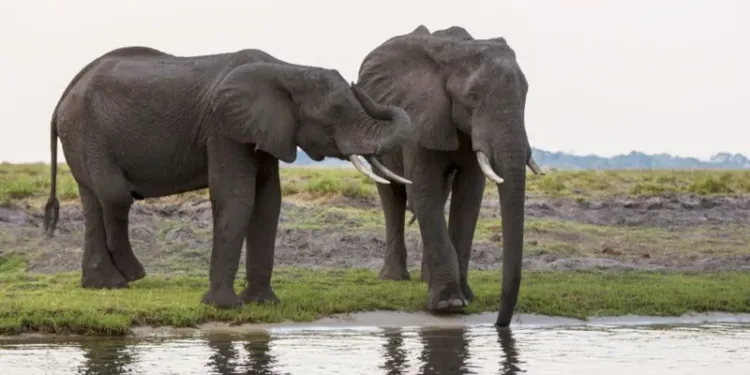President Mokgweetsi Masisi of Botswana has threatened to send 20,000 elephants to Germany.
Masisi made this offer in his response to the concerns raised by Germany’s environment ministry, which sought tighter restrictions on importing hunting trophies. This follows concerns about rising poaching and the effectiveness of trophy hunting in conservation efforts. The move has sparked debate.
Trophy hunting supporters argue it generates revenue for wildlife conservation programs, while critics claim it harms endangered species. The stricter limits, if implemented, could impact countries like Namibia and Botswana, which allow trophy hunting with quotas.
Displeased with the concern, Masisi told German media that it would only impoverish Botswanans.
According to the Botswana President, elephant numbers had exploded as a result of conservation efforts, and hunting helped keep them in check.
Germans should “live together with the animals, in the way you are trying to tell us to”, Masisi was quoted as saying.
“We would like to offer such a gift to Germany,” Masisi said, adding it was not a joke and he would not take no for an answer.
Botswana’s elephant population
Botswana boasts a remarkable achievement in wildlife conservation, hosting over 130,000 elephants, which accounts for approximately one-third of the global elephant population. However, this abundance has presented challenges as herds have been causing property damage, consuming crops, and posing risks to residents by their sheer presence.
In response to these challenges, Botswana has taken proactive measures to manage its elephant population. One strategy has been the translocation of elephants to other countries. Botswana has previously donated 8,000 elephants to nations like Angola and has extended offers of hundreds more to Mozambique. These actions aim to strike a balance in elephant numbers, mitigating the impacts of overpopulation while also supporting conservation efforts in neighboring countries and regions.
How Botswana shifted stance on trophy hunting
Botswana, home to Africa’s largest elephant population, has taken a complex and evolving approach to trophy hunting. In 2014, a nationwide ban was imposed by former president Ian Khama, an ardent conservationist. This decision garnered international praise, with Botswana becoming a symbol of wildlife protection. However, the ban wasn’t without its critics, particularly within Botswana itself.
The crux of the issue lies in balancing conservation efforts with the needs of local communities. Trophy hunting generates revenue through permit fees, which some communities argue is crucial for funding conservation initiatives and providing economic opportunities. These communities often live alongside elephants who damage crops and threaten lives. The hunting ban, they argued, took away a source of income and left them feeling powerless against the growing elephant population.
Khama’s administration countered that the revenue generated from trophy hunting was minimal compared to the economic benefits of tourism focused on viewing healthy wildlife populations. They also highlighted concerns that trophy hunting fueled poaching, as it blurred the lines between legal and illegal hunting.
Despite the debate, the ban remained in place for five years. However, in 2019, under the leadership of President Masisi, the ban was lifted. This decision sparked outrage from conservation groups worldwide, who argued it would lead to a decline in elephant populations. They pointed to rising poaching incidents in neighboring countries with open trophy hunting seasons.
The Botswana government maintains that the new policy involves a more nuanced approach. Hunting quotas have been established to ensure elephant populations remain sustainable. Additionally, revenue generated from trophy hunting will be directed towards local communities for conservation initiatives and infrastructure development. This, they argue, will foster a sense of ownership and encourage local participation in protecting wildlife.
The long-term impact of this policy reversal remains to be seen. Conservationists are cautious, monitoring elephant populations closely. Locals, on the other hand, express a sense of empowerment and hope that trophy hunting can bring economic benefits alongside responsible wildlife management.










